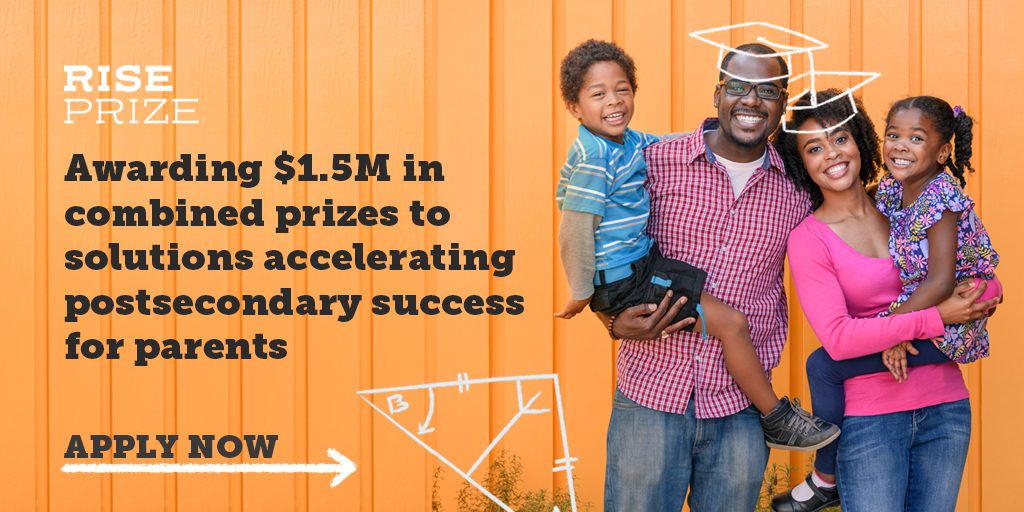United States 
We Need Innovative Thinking for Student Parents Now More than Ever
Why We’re Offering $1.5M in Prizes

United States 
Why We’re Offering $1.5M in Prizes

Successfully maintaining the tenuous balance between work, studies and raising children has always been challenging for student parents. The COVID-19 crisis has only magnified these challenges, creating more instability and uncertainty, and impacting student parents at every level.
Students like Lesley Del Rio. At 18, Lesley had a newborn, no high school diploma, and an unclear path forward. But Lesley found support through a local program for teen mothers and by 21 had graduated high school, started her postsecondary journey and entered the workforce. Southern New Hampshire University’s partnership with PelotonU gave Lesley the flexibility and in-person coaching she needed to re-enroll in higher education after stopping out. With their innovative approach, she was able to go after what she wanted and dream big for herself, and her son Leo.
Lesley has used her experience to help other parents navigate barriers in higher education as a Student Parent Advisor with the Aspen Institute and Imaginable Futures’ Postsecondary Success for Parents (PSP) Initiative. Lesley’s story shows that with support and compassion, students with children can thrive in higher education and put themselves and their families on the path to economic success. But with school closures, disruptions to childcare and uncertainty in employment, the needs of student parents like Lesley have never been more acute. The impact will likely extend well beyond the current crisis. [Read a personal account from Leslie of her story].
That’s why Imaginable Futures, a venture of The Omidyar Group, and Lumina Foundation, along with leading organizations in higher education, created the Rise Prize—awarding $1.5 million in prize money to organizations, changemakers and academic institutions who are working on creating ways to support student parents. We increased the prize pool by more than 50% and extended the deadline to May 17, in direct response to how the pandemic has affected our communities. We need bold ideas now more than ever to help student parents not only survive this crisis, but thrive today and in the future.

Supporting these driven and motivated students is one of the smartest investments we can make in higher education. Student parents make up nearly a quarter of the 17 million students enrolled in associate or bachelor’s degree programs. Parents also make up a large percentage of the 16 million students enrolled in trade schools, workforce and vocational training programs and alternative college pathways programs, and a significant portion of students who have left their postsecondary education programs and have some credits, and no degree. That lost potential means that millions of students who could have degrees or credentials, be earning higher incomes, and putting themselves and their families on the path to economic success are left behind.
Student parents are incredibly motivated and driven to succeed but barriers like lack of access to child care or inflexible schedules can make success difficult. Student parents tend to have higher GPAs than their non-parent peers yet are 10 times less likely to complete a bachelor’s degree within five years than students without children.
We know the scale of the issue. We also have evidence around what works. Student parents do meaningfully better when they have access to quality, affordable child care solutions, when they have support services and access to social capital. They need solutions that are adapted to their schedule and innovative approaches to financing their education.
Student parents need solutions that are adapted to their schedule and innovative approaches to financing their education.
These are just some of the areas in need of innovations that we hope to surface and fund through the Rise Prize. We are seeking to help proven solutions scale, while also helping new ideas to get traction and flourish. To make this work, we’ve assembled an incredible network of partner organizations who are pooling their resources and expertise to make a substantial prize pool available to innovators, who should not be spending their precious time applying for multiple prize competitions (with varying criteria) scattered throughout the year. We want to collaborate to get put real money behind solutions that support student parents because we believe in their potential. Investing in student parents not only benefits individual students and their families, like Lesley and Leo, but society as a whole. It’s time we make our systems work for the people they’re intended to serve. It will take expertise across the domains of education, design, learning science, student parents themselves, and more—accompanied by an entrepreneurial spirit!
Student parents are a vital and valuable part of the postsecondary system, and more broadly of our society. They are exceptionally motivated for themselves and for their children, future-oriented and bright—the very students that postsecondary institutions should be clamoring to enroll. By accelerating the success for millions of student parents like Lesley, now, and beyond the COVID-19 crisis, we can drive greater economic well-being not only for this generation, but also for future generations to come.
For more about the Rise Prize visit www.theriseprize.com.